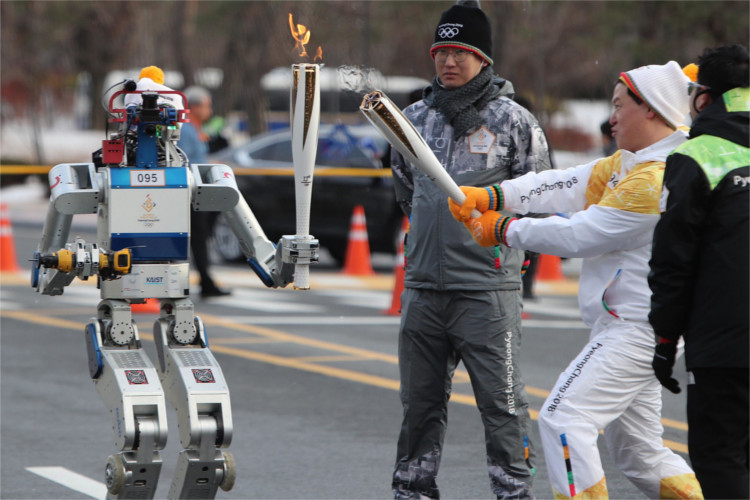Pyeongchang Olympics | A glimpse into the future of technology
PyeongchangThe 2018 Winter Olympics in Pyeongchang, South Korea, features athletes from 92 countries competing over the course of one hundred events. In addition to the thrilling spectacle of seeing some of the world’s best athletes competing, the Winter Olympics is also host to exciting technology ranging from uses of AI and self-driving buses to showcasing some of the world’s fastest internet speeds.
Much of the technology on display in Pyeongchang offers a glimpse into the future of technology.
Self-Driving Buses and Drones
In partnership with Korea’s Ministry of Land, Hyundai and KT have provided 5G-equipped autonomous buses for transport around the various slopes, stadiums, and rinks. Also, Hyundai and KT are using drones for entertainment, broadcasting and security services.
Self-driving vehicles may very well become the norm in the coming decades and help provide a safer transit experience with AI control reducing traffic by taking away human error and chances for accidents. For an event like the Olympics, with many people in need of shuttling from various venues, the role of AI is very important in safely and efficiently transporting attendees.
Intelligent Robots
Sci-fi has been depicting robots with an impressive level of intelligence for many decades. Real life has yet to bring such robots into the mainstream, but the Winter Olympic Games offer a glimpse at what the future may have in store.
In Seoul’s sprawling Incheon Airport, you can find robots escorting passengers to their gates while providing flight information. They even clean up! The robots utilize LG’s voice recognition technology and connect with the airport’s central computers to retrieve up-to-date information. Fittingly, for an airport, the robots can understand a variety of languages and scan your boarding pass.

In addition to these airport helpers, the Pyeongchang Organizing Committee has provided eighty-five robots across the Olympics’ various venues to act as personal guides in addition to offering schedules, tourism tips and game details.
South Korea and many other countries are likely to continue embracing robot technology — especially in public venues that aid people and help tidy up.
Instant Translation
Sometime in the future, it’s not unrealistic that technology will allow for instantaneous translation. Such technology could break down language barriers entirely. The 2018 Winter Olympics in Pyeongchang gives us a peek at such technology with GenieTalk — a collaboration between local software firm Hancom Interfree and Korea’s Electronics and Telecommunications Research Institute.
The voice-recognition app can translate Korean into 29 languages and can be found in 30 Furo-D robots, from local AI firm Future Robot. The robot, which is 5’3″ in height and features a 32″ touchscreen, acts as both translator and event guide for the Olympics.
Amazingly Fast Internet and 5G
South Korea has some of the world’s fastest internet speeds. The high-speed connection is on full display throughout the Olympics, with much of the technology in this article utilizing ultra-quick internet speeds that allow for instantaneous translation, up-to-date information, and self-driving vehicle navigation. In the future, the internet is bound to increase in speed for the average user. Similarly, access to the internet may increase as well.
The Olympic Games also bring to light South Korea’s role as a 5G testing ground and one of the countries at the forefront of efforts to advance the broadcasting industry. Specifically, KT is partnering with Intel and the South Korean government to use the games as a testing ground for 5G technology that’s impressive enough to handle massive data for virtual reality and hologram technology. On the Alpensia ski slope, KT and Intel have utilized a real-time 5G video system that plots skiers’ exact positions with GPS receivers.
Per a 2017 Yonhap News report, the 5G technology touts the ability to download an 800-megabyte movie in one second compared to 40 seconds on the LTE-Advanced Network, presently the world’s fastest. KT anticipates to roll out this type of 5G in 2021.
Immersive Viewing Technology
Some of the technology at the 2018 Winter Olympics in Pyeongchang doesn’t even require you to be there for the experience. Some technology requires you to do no more than watch. Specifically, South Korea’s broadcasters are airing the major events in the Ultra-High-Definition (UHD) standard, which touts four-times-higher resolution than HD. Also, these Olympics will see an increase in 360-degree virtual reality cameras, providing television viewers with their most in-depth look at the games ever.
In addition to an uptick in 360-degree virtual reality cameras, the Olympics feature Korean mobile carrier KT Corp’s Time Slice — a new perspective with the ability to provide first-person athlete perspectives and capture an athletes’ mid-motion from various angles. The 2018 Winter Olympics in Pyeongchang offers viewers a very immersive viewing experience, placing them in the athletes’ shoes more accurately than ever before.

This viewing technology increases the immersion when watching sports, hinting at a future where sports broadcasting strives to emulate the experience of the athlete while they are competing.
Training and Performance Technologies
Olympic athletes seek out every edge possible. With that in mind, there’s a variety of technology that helps athletes with their training and general performance.
One such technology is SmartBroom, which is used by many of the curling teams at the Olympics. Team Canada used the technology in Sochi 2014, where it aided both their men’s and women’s teams in winning gold medals. SmartBroom uses four sensors to relay data to a display measuring force, angle and brush stroke speeds, presenting the results in a Sweeping Performance Index to help guide strategy.
In speed skating, Samsung fit Dutch athletes Suzanne Schulting and Sjinkie Knegt with sensors that send out real-time body data to their coaches, such as posture and form. The skaters receive improvement suggestions in the form of haptic vibration signals. The technology is not permitted during the games themselves, but it serves as a great training tool.
The Pyeongchang Olympic Games have played host to athletes, fans and a variety of exciting technologies, some of which provide us with a glimpse of a truly exciting future.
